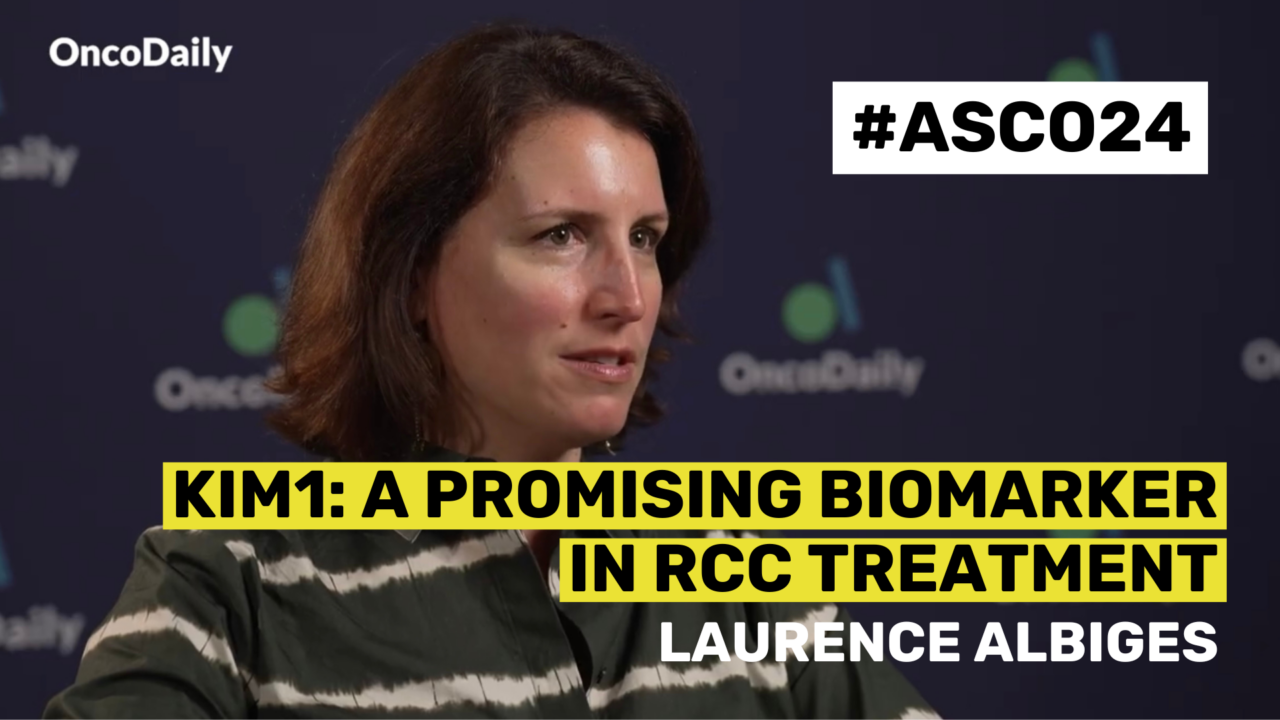
ASCO24 Updates: Dr. Laurence Albiges on KIM1: A Promising Biomarker in RCC Treatment
The American Society of Clinical Oncology (ASCO) Annual Meeting is one of the largest and most prestigious conferences in the field of oncology. This year, the meeting took place from May 31 to June 4 in Chicago, Illinois. The event gathers oncologists, researchers, and healthcare professionals from around the world to discuss the latest advancements in cancer research, treatment, and patient care. Keynote sessions, research presentations, and panel discussions are typically part of the agenda, providing attendees with valuable insights into emerging trends and innovations in oncology.
This year, OncoDaily was at ASCO 2024 for the first time covering the meeting on-site. We had the pleasure of interviewing researchers who summarized the highlights of their work.
In this video, Dr. Laurence Albiges, a medical oncology professor at Gustave Roussy Institute, shared insights on ‘Circulating kidney injury molecule-1 (KIM-1) biomarker analysis in IMmotion010: A randomized phase 3 study of adjuvant (adj) atezolizumab (atezo) vs placebo (pbo) in patients (pts) with renal cell carcinoma (RCC) at increased risk of recurrence after resection.‘
My name is Laurence Albiges. I’m a medical oncology professor of medical oncology and head of the medical oncology department in Gustave Roussy Institute in France. At this ASCO 2024 meeting, I had the chance to report the first circulating biomarker analysis in an adjuvant immune checkpoint inhibitor trials.
So it is established that adjuvant checkpoint inhibitor is now a standard of care with pembrolizumab being approved, but several trials read out to be negative, and one of them was the EMOTION-010 study, which randomized patients after surgery to receive atezolizumab or placebo. This study did not demonstrate a benefit for atezolizumab, but it has been the platform for developing a circulating biomarker analysis. And this is what we’ve been presenting at this ASCO meeting.
We explored the expression of circulating protein, meaning in the blood, between baseline and at time of recurrence to screen for the one that would be the most highly differentially expressed, and one stand out. It is kidney injury molecule 1, named as KIM1. It is a well-known one because in the past, it has been used to distinguish benign versus malignant kidney mass, but also has been explored in the ASHER study, which in the past randomized patient to receive Sunitinib or sorafenib versus placebo.
And what we know about the circulating biomarker, it was associated with disease-free survival and overall survival. So for the first time, we’re reporting this circulating biomarker in a prospective immune checkpoint inhibitor trial. And what we were able to demonstrate is that KIM1 was associated with disease-free survival in the EMOTION-010 study, meaning that patient with higher KIM1 had a higher likelihood of relapsing.
But second, that it was also associated with the response to atezolizumab or the benefit of atezolizumab, I would say. So it could have a potential predictive value on top of a prognosis value. And ultimately, we also demonstrated that it was associated at the time of relapse with an increased expression of KIM1, making this biomarker potentially suitable for monitoring our patient.
So taken all together, this is exploratory analysis within EMOTION-010 study, looking at a circulating biomarker, identifying KIM1 as a candidate for further use and at least further exploration as a potential minimal residual disease biomarker, but also not only prognostic, potentially predictive of immune checkpoint inhibitor use. It needs to be prospectively validated, but it is the first time we’re having a circulating biomarker for localized RCC.
More videos and content from ASCO 2024 on OncoDaily.
-
Challenging the Status Quo in Colorectal Cancer 2024
December 6-8, 2024
-
ESMO 2024 Congress
September 13-17, 2024
-
ASCO Annual Meeting
May 30 - June 4, 2024
-
Yvonne Award 2024
May 31, 2024
-
OncoThon 2024, Online
Feb. 15, 2024
-
Global Summit on War & Cancer 2023, Online
Dec. 14-16, 2023
